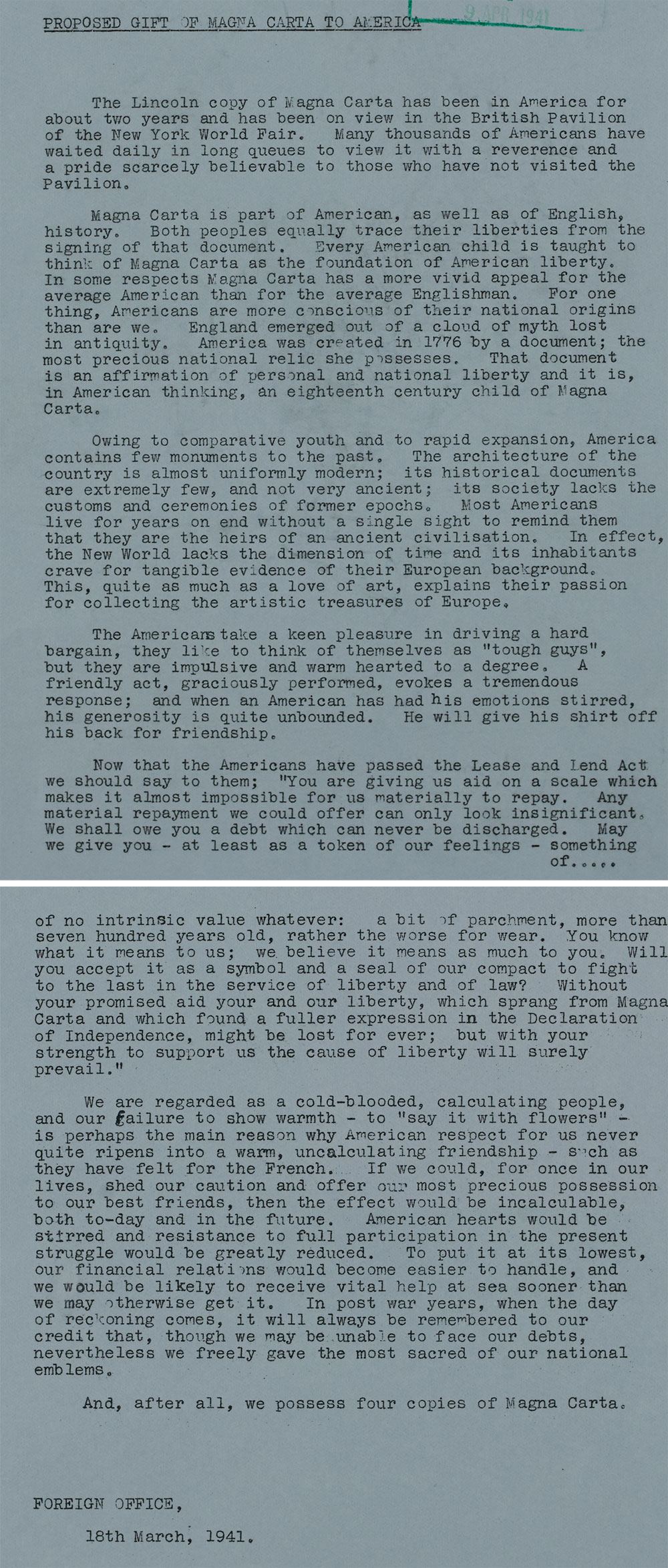Foreign Office document proposing that Magna Carta be gifted to the USA during the Second World War. The document notes that Magna Carta holds no ‘instrinsic value’. The proposal was eventually rejected. Dated 18 March 1941 (FO 371/26169).
Transcript
Proposed Gift of Magna Carta to America
The Lincoln copy of Magna Carta has been in America for about two years and has been on view in the British Pavilion of the New York World Fair. Many thousands of Americans have waited daily in long queues to view it with a reverence and a pride scarcely believable to those who have not visited the Pavilion.
Magna Carta is part of American, as well as of English, history. Both peoples equally trace their liberties from the signing of that document. Every American child is taught to think of Magna Carta as the foundation of American liberty. In some respects Magna Carta has a more vivid appeal for the average American than for the average Englishman. For one thing, Americans are more conscious of their national origins than are we. England emerged out of a cloud of myth lost in antiquity. American was created in 1776 by a document; the most precious national relic she possesses. That document is an affirmation personal and national liberty, and it is, in American thinking, an eighteenth century child of Magna Carta.
Owing to comparative youth and to rapid expansion, America contains few monuments to the past. The architecture of the country of the country is almost uniformly modern; its historical documents are extremely few, and not very ancient; its society lacks the customs and ceremonies of former epochs. Most Americans life for years on end without a single sight to remind them that they are the heirs of an ancient civilisation. In effect, the New World lacks the dimension of time and its inhabitants crave for tangible evidence of their European background. This, quite as much as a love of art, explains their passion for collecting the artistic treasures of Europe.
The Americans take a keen pleasure in driving a hard bargain, they like to think of themselves as “tough guys”, but they are impulsive and warm hearted to a degree. A friendly act, graciously performed, evokes a tremendous response; and when an American has had his emotions stirred, his generosity is quite unbounded. He will give his shirt off his back for friendship.
Now that the Americans have passed the Lease and Lend Act we should say to them; “You are giving us aid on a scale which makes it almost impossible for us materially to repay. Any material repayment we could offer can only look insignificant. We shall owe you a debt which can never be discharged. May we give you – at least as a token of our feelings – something of no intrinsic value whatever: a bit of parchment, more than seven hundred years old, rather the worse for wear. You know what it means to us; we believe it means as much to you. Will you accept it as a symbol and a seal of our compact to fight to the last in the service of liberty and of law? Without your promised aid your and our liberty, which sprang from Magna Carta and which found a fuller expression in the Declaration of Independence, might be lost for ever; but with your strength to support us the cause of liberty will surely prevail.”
We are regarded as a cold-blooded, calculating people, and our failure to show warmth – to “say it with flowers” – is perhaps the main reason why American respect for us never quite ripens into warm, uncalculating friendship – such as they have felt for the French. If we could, for once in our lives, shed our caution and offer our most precious possession to our best friends, then the effect would be incalculable, both to-day and in the future. American hearts would be stirred and resistance to full participation in the present struggle would be greatly reduced. To put it at its lowest, our financial relations would become easier to handle, and we would be likely to receive vital help at sea sooner than we may otherwise get it. In post war years, when the day of reckoning comes, it will always be remembered to our credit that, though we may be unable to face our debts, nevertheless we freely gave the most sacred of our national emblems.
And, after all, we possess four copies of Magna Carta.
FOREIGN OFFICE,
18th March, 1941.
